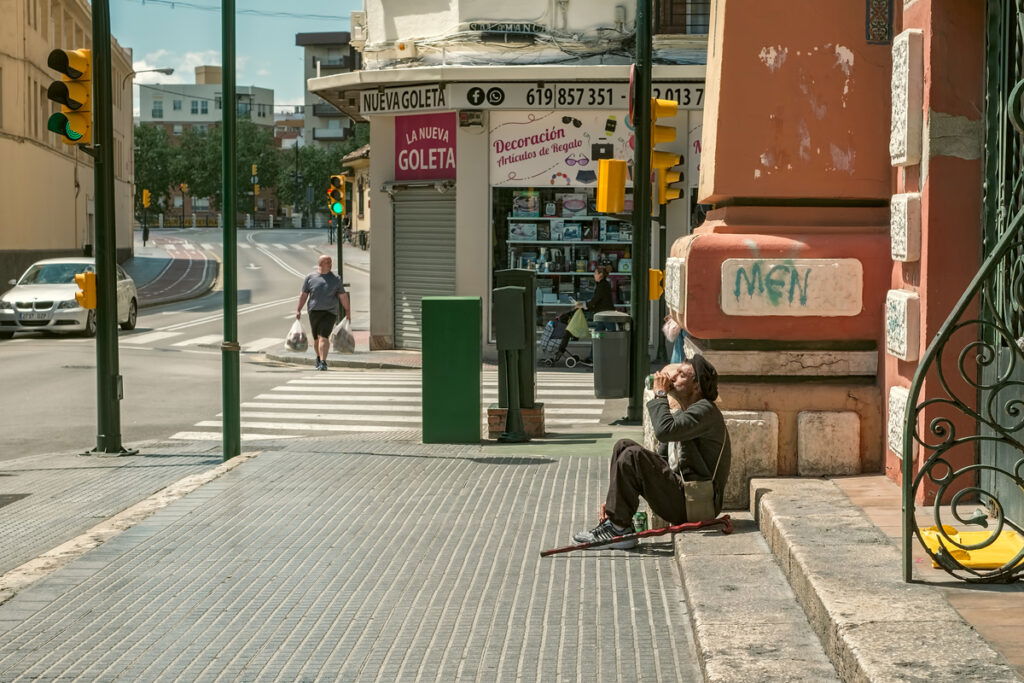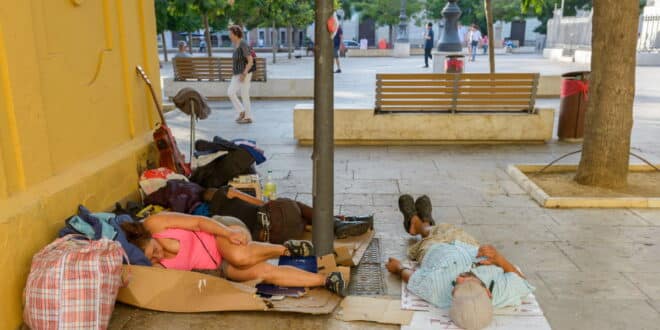Costa del Sol is thriving economically but there are growing homelessness issues that can’t be ignored. Malaga Council documents reveal that despite the region’s success, it is home to the largest number of homeless people.
Malaga Council says that this is due in part to its climate, cosmopolitan attraction, and strategic location. A kind of Hollywood for those hoping to get a break. In 2023 the Municipal Reception Centre of Malaga City, (CAM), provided services to 8,71 homeless people.
The mild Mediterranean climate and multicultural demographics combined with the booming tourism industry attract not only tourists but also people on the edge of economic despair. Council reports claim that these factors have made Malaga a magnet to homeless populations. This is a challenge further compounded with a severe housing shortage. Recent reports indicate that 37,000 Malaga residents have fled the province in the last five years because of unaffordable living conditions.

Credit: Roberto Sorin – Shutterstock
The housing shortage in the region is likely to contribute to homelessness in the region, along with stagnant pay rates, particularly in the hospitality industry. Andalucia’s share of Spain’s 28,552 shelter-users reported by the Spanish National Institute of Statistics in 2022, was estimated at around 5,100.
In response, Malaga’s council is looking for a private company to contract for a new €425,853 technical services company to support the homeless population, with a planned start date of March 1, 2026. This follows a failed €11.4 million bid to overhaul the city’s homeless support system, which collapsed when none of the three bidding companies met the required criteria. The new contract aims to go beyond temporary assistance and provide a comprehensive social reintegration by using a “biopsychosocial approach”. Services will include social work, psychological support, socio-healthcare, and accompaniment for homeless individuals and families temporarily housed at the CAM on Calle Donoso Cortés in the city.
The initiative is a little like what the charity ADINTRE is doing in Fuengirola—not only feeding the poor, but also working with psychologists to pick people up and put them back on their feet again.
Malaga Council will deploy an inter-disciplinary team consisting of four social workers (social workers), a psychiatrist, two nurses and monitors or “drivers”, to deal with the complex problems that have led to people becoming homeless. They can include mental disorders, substance abuse or lack of financial resources. The programme is aimed at long-term integration. It provides job placement support, access to leisure activities, health promotion as well as health promotion.
There are huge obstacles to overcome despite the efforts. One of them is the lack of accurate regional data. Andalusia has an estimated 5,100 homeless, based on the national average. This shows that better local statistics are needed. The Daily Express reported in 2025 that homeless people were sleeping at Malaga Airport. This suggests the problem could grow as cities tighten their regulations. Malaga authorities are under pressure with the tender running until August 21 to provide effective solutions that address the hidden costs of city success.
Homelessness is not as severe in Costa del Sol, compared to other major cities, such as Barcelona, Paris and London. But the rise in people sleeping rough must be addressed urgently before it follows the path of these urban centres, where this issue has been ignored for too long.
 Costa News Spain Breaking News | English News in Spain.
Costa News Spain Breaking News | English News in Spain.







